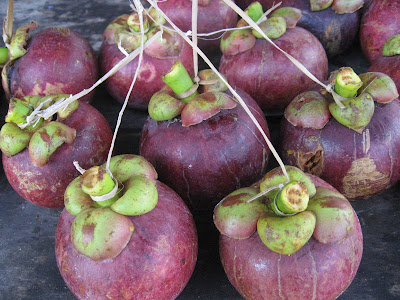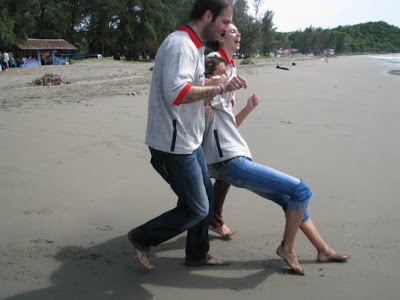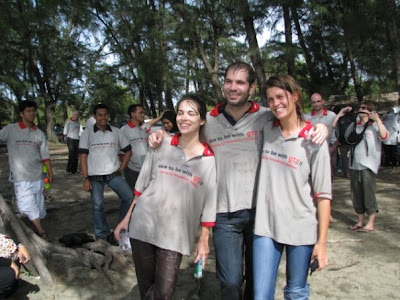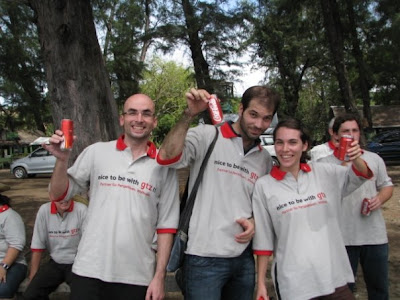BBC article:
UN classifies rape a 'war tactic'
The UN Security Council has voted unanimously in favour of a resolution classifying rape as a weapon of war.http://news.bbc.co.uk/2/hi/americas/7464462.stm
Bonjour à tous, veuillez retirer vos chaussures. Ne soyez pas timides, rentrez donc dans notre petit havre cybernautique. Pour partager, commenter, aimer, détester, critiquer, adorer, saboter (z'avez pas intérêt),amer-liorer, croustiller, grogner, karater, andouiller, papouatiser, débattre,avancer, tenter, métisser,poil-au-ner… Voici des photos, articles, idées, pensées, sentiments, chatouillements, grognements, agacements, tout ça très très gentiment... Hope you enjoy- Emily & Abel
 Erwin on lobster night
Erwin on lobster night



TEL-AVIV ENVOYÉ SPÉCIAL
Alangui à la terrasse d'un café branché de Tel-Aviv, vêtu d'un tee-shirt à fleurs, d'un pantalon de toile et d'une paire de sandales, Doron Efrati, 23 ans, n'a pas véritablement l'allure du bidasse sans scrupule capable de tirer du lit une famille entière de Palestiniens à la pointe de son fusil. C'est pourtant ce qu'il a fait à l'occasion de son service militaire effectué entre 2003 et 2006 en Cisjordanie. "On débarque en douce dans un quartier, on jette des pierres ou une grenade assourdissante contre la porte d'une maison et on hurle : "C'est l'armée, ouvrez !". Ensuite, on fait sortir tout le monde dehors et on fouille de fond en comble l'intérieur. Une fois qu'on a fini, on passe à une autre maison et ainsi de suite pendant une bonne partie de la nuit. L'idée, c'est de saisir des armes ou du matériel de propagande, mais surtout de maintenir la population palestinienne dans un état de peur permanente. Comme disent les chefs, "il s'agit de manifester notre présence"."
Dégoûté par ce qu'il a vu et vécu, Doron a décidé de parler, à l'inverse de la plupart des conscrits israéliens, qui s'empressent de partir sous les tropiques pour mieux oublier. Son témoignage figure avec une centaine d'autres dans un livret publié il y a quelques semaines par l'organisation Breaking the Silence (Rompre le silence). Depuis sa création en 2004, cette association, financée par l'Union européenne, a récolté les témoignages d'environ cinq cents anciens soldats, témoins des abus, petits ou grands, vicieux ou criminels, perpétrés par les troupes d'occupation israéliennes dans la région d'Hébron. Des exactions encouragées par le statut très particulier de cette cité qui abrite le tombeau d'Abraham et dont le centre est noyauté par 800 colons juifs, barricadés derrière un dédale de barrages militaires qui pourrit la vie des 160 000 autres habitants de la ville, tous Palestiniens.
"Ça m'est souvent arrivé de prendre la relève de collègues affectés à un barrage et de découvrir que des Palestiniens y sont bloqués et menottés depuis des heures, parce qu'ils ont soi-disant manqué de respect aux soldats", dit Iftakh Arbel, 23 ans, une autre recrue de Breaking the Silence. Des humiliations, qui à la lecture du fascicule de l'association, apparaissent comme routinières. Il y a, par exemple, ce marchand d'accessoires automobiles chez lequel des soldats viennent se servir sans payer et dont ils menacent de fermer le magasin s'il ose déposer plainte. Il y a aussi cette unité qui, un jour de désoeuvrement, décide de casser les vitres d'une mosquée pour déclencher une émeute et s'offrir une tranche d'"action". Et puis ce "jeu" que décrit l'un des témoins, consistant à arrêter quelques passants dans la rue et à les étrangler à tour de rôle tout en surveillant sa montre. "Le gagnant est celui qui met le plus de temps à s'évanouir."
Mais il y a plus grave. Le témoignage numéro 49, donné par un soldat qui entend conserver l'anonymat, décrit en détail le passage à tabac d'un jeune lanceur de pierres par un officier israélien. "Il l'a démonté, il l'a mis en pièces, raconte le témoin. Le gamin ne pouvait plus tenir sur ses jambes. Nous, on regardait, indifférents. C'est le genre de truc que l'on faisait tous les jours (...). A la fin, le commandant a mis le canon de son arme dans la bouche du gosse, juste devant sa mère, et a déclaré que la prochaine fois qu'il l'attrapait avec une pierre à la main, il le tuerait."
Iftakh Arbel a touché de près ce processus d'aliénation qui transforme un bon gars en butor. "Tu alternes huit heures de garde et huit heures de repos pendant dix-huit jours. Ça t'épuise, tu t'ennuies à mourir. Tu te mets à haïr les colons à cause de toutes les horreurs qu'ils commettent et les Palestiniens aussi, parce que leur existence est la raison même de ta présence à Hébron. Alors tu essaies de t'occuper. Tu contrôles un Palestinien sans raison. Et s'il ose protester, tu te retrouves à le frapper, juste parce que tu as le pouvoir."
Parfois le défouloir se solde par la mort d'un Palestinien. "C'était dans le camp de réfugiés d'Al-Fawwar, au début de l'année 2004, raconte Doron Efrati. Un gamin avait balancé un cocktail Molotov sur nos Jeep. Dans une situation pareille, la consigne c'est de viser le haut du corps, c'est-à-dire de tirer pour tuer, même si ce n'est pas dit explicitement. Le temps que l'on sorte de nos Jeep, le gamin avait disparu. Sur ordre de notre chef, une embuscade a été tendue. Le gamin a finalement été abattu par un sniper, plus de quarante minutes après avoir lancé son cocktail Molotov. Le commandant de la brigade a voulu ouvrir une enquête, mais l'un de ses supérieurs l'en a dissuadé."
En réaction à la sortie du livret de Breaking the Silence, l'armée israélienne a parlé de "brebis galeuses", "de témoignages anonymes invérifiables" et insiste sur son souci de juger tous les forfaits dont elle a connaissance. Fin avril, deux gardes frontières qui avaient tué un Palestinien en 2002, en le projetant hors de leur Jeep qui roulait à 80 km/h dans les rues de Hébron, ont été condamnés à six et quatre ans de prison ferme. Une sanction tardive, excessivement légère et surtout trop rare, selon Iftakh. "Il faut que les Israéliens comprennent que leur tranquillité a un coût moral exorbitant, dit-il. Actuellement, ce sont les jeunes appelés qui le paient. Mais bientôt, c'est toute la société qui sera corrompue."




Financial Times (UK)
April 15, 2008
Aceh at risk of economic collapse
By John Aglionby in Jakarta
A failure to develop agriculture and other sustainable economic activities in Aceh threatens to destabilise the Indonesian province over the next year, the author of a study of areas devastated by the 2004 Indian Ocean tsunami warned on Monday.
Craig Thorburn, from Monash University in Australia, said tensions could be exacerbated by the unreasonably high expectations of provincial and district leaders, combined with their low capacity to deliver economic growth and resentment over the allegedly inequitable distribution of funds to ex-combatants after the end of a 29-year separatist conflict in 2005.
The uncertainty, heightened by national and local elections next year, has resulted in investors staying away from the northern tip of Sumatra island. Some 168,000 people were killed and 500,000 left homeless by the earthquake and tsunami that affected 14 countries around the Indian Ocean.
Dr Thorburn said 14 companies had signed significant deals but none had actually invested.
“There’s a great risk in the next couple of years,” he said at the launch of a multi-donor report on assessing local capacity and reconstruction assistance. “People are adopting a wait-and-see attitude [towards investing] to see if [the province] blows.”
Agriculture is likely to absorb most survivors currently in reconstruction, but recovery efforts in the sector are “barely getting under way”, the report says, because fields remain largely unrehabilitated since people have sought more lucrative short-term employment.
A World Bank report on Aceh published last week reached similar conclusions. It warned that because of “scant evidence of private investment in the primary or secondary sectors of the economy ... there will be upward pressure on the unemployment rate”, while food imports increased for the third consecutive year in 2007.
Dr Thorburn forecast that Aceh would have a bright future if economic and social collapse could be avoided over the next two years.
The assessment report, involving input from the Australian and Indonesian governments, United Nations, Oxfam, Muslim Aid, and Catholic Relief Services, concludes that much of the housing reconstruction was too hurried, without sufficient community input or co-ordination. The result is that, in many areas, up to 40 per cent of newly built or repaired houses are uninhabited.
Jakarta, 15th June 2007. Almost two years after the Helsinki peace accord was signed, Acehnese civilians continue to suffer a high rate of combat trauma, the International Organization for Migration and Harvard researchers have found in the first Aceh-wide study of conflict related trauma and depression.
The assessment which evaluates the mental health needs of people affected by the 29-year conflict between Indonesian security forces and the Free Aceh Movement (GAM), was conducted with assistance from Syiah Kuala University, the Indonesian Health Department and funded by the World Bank, the Decentralization Support Facility, Harvard University and IOM.
The assessment conducted in high-conflict communities across 14 districts of Aceh, found that 35 percent ranked high on symptoms for depression, 10 percent for Post-Traumatic Stress Disorder (PTSD) and 39 percent for anxiety.
Nearly three quarters (74 percent) of the randomly selected sample of the 1,972 civilians from 105 villages report living through combat, 28 percent have experienced beatings, and 38 percent had a family member or friend killed during the conflict.
Civilians in South Aceh and along Aceh's East coast experienced even higher rates of traumatic events, and as a consequence display high levels of symptoms for mental illnesses. For example, 41% of villagers surveyed from the south and west coast suffered high rates of depression symptoms, 43% anxiety symptoms and 14% PTSD symptoms.
A Psychosocial Needs Assessment of Conflict-Affected Communities in 14 Districts of Aceh was not designed to catalogue or identify groups or individuals allegedly responsible for causing trauma.
But the reports authors say that this traumatized portion of Aceh's population could be possible triggers for further violence, if left untreated.
"These memories are alive in the community, and they have the tremendous power to reproduce that violence. These traumatized individuals can become stressors for the rest of their community," said Professor Byron Good, one of the reports authors, from the Harvard's School of Social Medicine.
The report calls on the Indonesian government to fund desperately needed mental health services, as well as on the international community involved in Aceh's post-tsunami reconstruction to incorporate psychosocial care as part of their programmes.
"This report shows that many civilians in Aceh, where one of South-East Asia's long running conflicts has raged until recently, are in urgent need of specialized mental health care," said Professor Good.
"Developing a mental health system that reaches these traumatized individuals, who are often located in remote, widely dispersed villages, is essential for Aceh's future," added Professor Good.
In response to results from this study, the World Bank, with funding from the British government's foreign aid agency, DIFID, has agreed to fund IOM's outreach mental health programme in Bireuen and North Aceh which will target 3,000 individuals, in ten sub-districts, over 12 months.
"This unique mobile programme, which provides both basic health care and psychosocial care, will provide an important service to remote villages in two of Aceh's most conflict-affected districts," said Steve Cook, IOM's Indonesian mission chief.
In response to the results of a 2006 assessment of Aceh's mental health needs, which revealed that civilians in three districts displayed levels of combat-related trauma comparable to the Bosnians in the Balkan war, and Afghanistan, IOM launched a six-month outreach health programme in Bireuen. Since January 2007, the mobile clinics, which work together with the government community health centres or puskesmas, have targeted 14,000 civilians, and treated 581 patients suffering mental illnesses.
Copyright © IOM. All rights reserved.
How did women fare in 2007?
This article offers a glimpse at a few of last year's gains and setbacks for women all over the world.
By Kathambi Kinoti
The Association for Women's Rights in Development
215 Spadina Avenue, Suite 150
Toronto, ON M5T 2C7
CANADA
Tel: 416-594-3773
Fax: 416-594-0330
Email: awid@awid.org
Web: www.awid.org